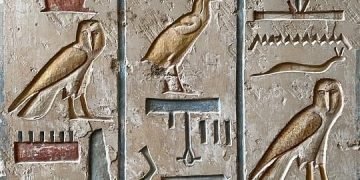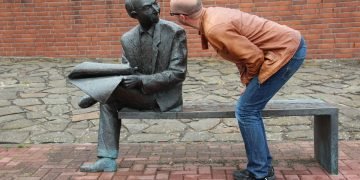Uncovering the Mysteries: 10 Curious Historical Facts That Will Amaze You
History is full of fascinating stories and events that continue to captivate our imagination. From ancient civilizations to modern times, there are countless mysteries waiting to be uncovered. In this article, we will explore 10 curious historical facts that are sure to amaze you.
The Great Wall of China is not visible from space
Contrary to popular belief, the Great Wall of China is not visible from space with the naked eye. While it is an impressive feat of engineering and stretches over 13,000 miles, it is simply too narrow to be seen from such a distance. This myth has been perpetuated for years, but in reality, the Great Wall is only visible from low Earth orbit.
The Library of Alexandria was not burnt down by Julius Caesar
One of the most enduring myths of ancient history is that Julius Caesar was responsible for the destruction of the Library of Alexandria. In reality, the library was likely destroyed over a period of time due to a combination of factors, including fires, wars, and neglect. While it is true that Julius Caesar may have set fire to some ships in the harbor during a siege, there is no concrete evidence to suggest that he intentionally destroyed the library.
Cleopatra VII was not Egyptian
Despite being one of the most famous figures in ancient history, Cleopatra VII was not actually Egyptian. She was a member of the Ptolemaic dynasty, which was of Greek descent and ruled over Egypt after the death of Alexander the Great. Cleopatra was the last pharaoh of Egypt and is known for her relationships with Julius Caesar and Mark Antony.
The Titanic’s distress signals were heard by another ship, but they were ignored
When the RMS Titanic struck an iceberg and began to sink in 1912, distress signals were sent out to nearby ships. The closest vessel, the SS Californian, did receive the signals but failed to respond. This tragic oversight may have cost hundreds of lives, as the Californian was only a few miles away from the stricken Titanic.
The Declaration of Independence was not signed on July 4th
While July 4th is celebrated as the day the Declaration of Independence was adopted by the Continental Congress in 1776, the document was actually signed over a period of several weeks. The official signing took place on August 2nd, 1776, with some delegates adding their signatures later that year. The famous date of July 4th is simply when the document was approved and sent to the printer.
Christopher Columbus did not discover America
Despite being credited with “discovering” America, Christopher Columbus never actually set foot on the continent. Instead, he landed in the Caribbean islands in 1492, believing he had reached Asia. It was actually Amerigo Vespucci who first realized that Columbus had stumbled upon a new landmass, leading to the adoption of the name “America” in his honor.
The Great Fire of London did not stop the Black Death
One common misconception is that the Great Fire of London in 1666 helped to stop the spread of the Black Death. In reality, the fire destroyed much of the city but had little impact on the plague, which had already been in decline for several years. While the fire did lead to improvements in sanitation and building codes, it did not directly affect the course of the epidemic.
The Salem Witch Trials were not the largest in history
While the Salem Witch Trials of 1692 are well-known for their hysteria and tragic outcomes, they were not actually the largest witch trials in history. The European witch hunts of the 16th and 17th centuries saw tens of thousands of people accused of witchcraft and executed. The trials in Salem, Massachusetts were significant for their impact on American history, but they were relatively small in comparison to the scale of witch hunts in Europe.
The Hanging Gardens of Babylon may not have existed
One of the Seven Wonders of the Ancient World, the Hanging Gardens of Babylon are often considered a marvel of engineering and design. However, there is some debate among historians as to whether the gardens actually existed. While ancient texts describe the gardens in detail, there is little archaeological evidence to support their existence. Some believe that the gardens may have been a myth or a mistranslation of another structure.
Queen Elizabeth I was not the virgin queen
Queen Elizabeth I of England is often referred to as the “Virgin Queen” due to her unmarried status. However, recent research suggests that Elizabeth may have had several romantic relationships throughout her reign, including with Robert Dudley, the Earl of Leicester. While she never officially married, Elizabeth’s personal life remains a topic of debate among historians.
Conclusion
History is full of fascinating stories and mysteries that continue to intrigue us to this day. From ancient civilizations to modern times, there are countless facts and events waiting to be uncovered. By exploring these 10 curious historical facts, we can gain a deeper understanding of the past and appreciate the complexities of the world we live in.
Whether it’s debunking myths about famous figures or shedding light on lesser-known events, the study of history allows us to connect with the people and events that have shaped our world. By delving into these mysteries, we can gain a new perspective on the past and gain a greater appreciation for the rich tapestry of human history.
So the next time you come across a historical fact that seems too strange to be true, take a closer look. You may be surprised by what you uncover.













